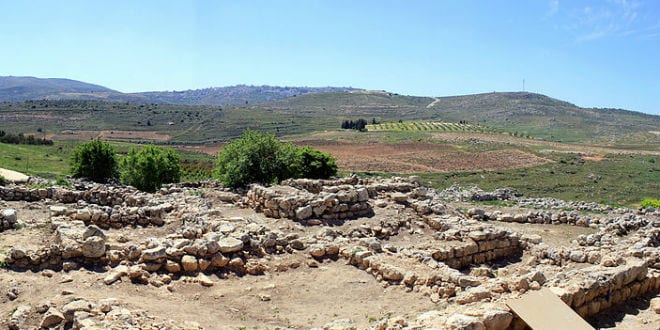Dr. Scott Stripling, provost at The Bible Seminary in Katy (Houston) Texas, has been sifting the sands of Israel for over 20 years. Using the Bible as a guidebook he is now digging in Shiloh, which he surmises may be the true site of the Tabernacle. However, some of his fiercest critics are Israeli archaeologists who claim the Bible cannot be relied upon to tell historical truth.
Dr. Stripling returned home Tuesday after 50 days of excavations at Shiloh. Stripling serves as the archaeological director for the Associates for Biblical Research (ABR), a Christian organization that brings together Biblical research and archaeology to mutually advance both disciplines.
After 20 years at Khirbet el-Maqatir, Stripling moved his team ten miles north to Shiloh last year. In addition to its significant archaeological relevance, Shiloh is important for being mentioned in the Bible as being the site of the Jewish Tabernacle for 369 years. Or so Stripling believes, though not all archaeologists agree with him.
“I can tell with 100 percent certainty that there were Israelites in Shiloh because of the many indicators we have,” Dr. Stripling told Breaking Israel News. “The pottery shows that they were there when the Bible says they were there. I cannot yet say that I have 100 percent archaeological evidence the Jewish Tabernacle stood at Shiloh. We do find many reasons to seek confirmation of the Biblical text. There are indications, like the large amount of animal bones that are consistent with the Biblical sacrificial system, and the large east-west walls we are excavating.”
The ABR team also uncovered a ceramic pomegranate, a motif that has been found at other sites connected with the priests. Sadly, definitive proof of the Tabernacle may never materialize.
“The artifacts and materials we have found are consistent with the Tabernacle but the Tabernacle itself was made of animal skins,” Stripling explained. “Very little of the Tabernacle would remain for us to find.”
Prof. Israel Finkelstein, a prominent Israeli archaeologist who led the dig at Shiloh in the early 1980’s, disagrees with Stripling and does not concur that the Biblical description of the Tabernacle is historically accurate. Unlike Stripling, Finkelstein said that a lack of physical evidence is proof that the Jewish Tabernacle never stood at Shiloh.
“Biblical traditions should be read on the background of their time of composition, the ideology of the authors, etc. One cannot approach them in a simplistic manner,” Finkelstein, a Professor of Archaeology at Tel Aviv University, told Times of Israel in a recent interview. “The story of the Ark is fascinating; but it can teach us mainly about the world of the authors who lived centuries after the destruction of Iron [Age] I [which ended around 1,000 BCE] Shiloh.”
Stripling is at odds with Finkelstein and many other Israeli archaeologists over the site, but more importantly, over a greater issue that touches on the entire discipline as it is practiced in Israel. Stripling uses the Bible as a historical guidebook.
“I use the Bible as a serious historical document to the same extent that I use any serious literary source,” Stripling explained. “It would be foolish not to. I have found numerous synchronisms between the archaeological data and the Biblical text. That does not hinder me from doing vigorous scientific research. If anything, it empowers me.”

Dr. Stripling addressed this very issue in his book, The Trowel and the Truth. He explained that the dispute is framed as minimalism versus maximalism.
“There is an accusation some make that if you happen to believe what you are reading in the Bible it disqualifies you as a scientist,” Stripling said. “In Israel, most of the archaeologists are secular and atheists. They do not accept the Bible as a historical text. That puts me outside of the mainstream of archaeology but that’s precisely where I want to be.”
“Minimalists, like Finkelstein, say that you can’t trust the Bible,” Stripling said. “Maximalists, like me, maintain that the Bible is a historical document.”
This has indeed set him at odds with his peers in Israel.
“This is a hot topic in Israeli archaeology today and there’s not a day that goes by that someone isn’t angry at me,” Stripling said. “In the past, the minimalists were able to ignore maximalists. They can’t do that anymore because we are bringing in results.”
Stripling speculated that there could be several causes of this anti-Bible approach in the world of Israeli archaeology.
“It may be driven by the personal religious inclinations of the archaeologists,” he said. “It may also be driven by their personal political agenda since the historical narrative has implications in current politics.”
“It may also be that a lot of these archaeologists were trained under a secular paradigm that said that there is no relationship between the archaeological data and the Biblical text. Some secularists, when they see the evidence, they are fair-minded and open.”
“I engage these people in the arena of ideas,” Stripling noted. “If my ideas, based on the Bible as a historical text, can’t stand up to scrutiny, then they are not very good ideas.”




